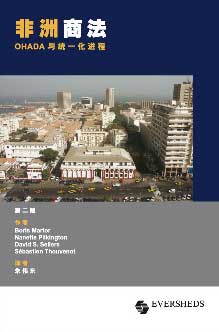
Authors:
Boris Martor, Nanette Pilkington, David S. Sellers, Sébastien Thouvenot - Eversheds lawyers.
The new Chinese edition of this authoritative book offers a fully updated and more detailed overview of the aims and achievements of the OHADA common system of business laws (Organization for the Harmonisation of Business Law in Africa) and explains in depth the legislation that has been issued to date.
- Authoritative analysis of the OHADA initiative to create a unified commercial law for Africa.
- Explains the institutions, the principles laid down in the OHADA treaty and the provisions of the Uniform Acts.
- Considers the latest developments, future Uniform Acts, and the legal context beyond OHADA.
- An invaluable resource for Chinese investors in Africa and their advisers.
The purpose of this OHADA textbook in Chinese is to promote the OHADA business law unification process, a unique and historic endeavor, in China which has become an essential partner for Africa. It sets out how business legal harmonization has become an essential step for encouraging foreign investment in Africa and the development of sustainable pan-African trade. Now in a new Chinese-language edition, this important book explains this unique legal system now in place and promoted by OHADA.
OHADA is an international organization currently comprising 16 African states: Benin, Burkina Faso, Cameroon, Central African Republic, Chad, the Federal Islamic Republic of the Comoros, Congo, Equatorial Guinea, Gabon, Guinea, Guinea-Bissau, Ivory Coast, Mali, Niger, Senegal and Togo. Sao-Tomé, Cape Verde and the Democratic Republic of Congo (DRC) are about to become members. As a result of the creation of OHADA, business law in these African countries has recently entered a new era.
OHADA's essential aim is to promote economic integration and development by creating a secure and adapted legal framework for the conduct of business in Africa. In order to achieve this aim, OHADA has enacted a number of laws, known as Uniform Acts, on various aspects of business law including commercial and company laws, insolvency, securities and arbitration. These Uniform Acts have direct effect throughout the OHADA's member states.
The authors are all international lawyers at the Paris office of global law firm Eversheds LLP.
The Chinese translation of has been produced by Dr.
Zhu Weidong, Associate Professor of Private International Law, Centre for African Laws and Society, Faculty of Law, Xiangtan University Hunan Province, in collaboration with Professor
Salvatore Mancuso, Professor of Business Law and Comparative Legal Systems, University of Macau.
Note to editors : China has a long history of trading with Africa but economic relations between China and Sub-Saharan countries in particular have expanded enormously in recent years. China's overall trade with Africa rose from $10.6bn in 2000 to $40bn in 2006 and the Beijing Summit of the Forum on China-Africa Cooperation held in November 2006 set a goal of doubling two-way trade between Africa and China to $100 billion in the near future.
Release Date: July 2008
Extent: 324 pages
Product dimensions: 234x156mm
Publisher: GMB Publishing
Authors' residence: France
Available: on the Internet and in bookstores
Readership: Legal and business development executives in major global companies, international law firms, accountants and management consultants, students of international business law, government agencies, and NGOs concerned with Africa.
For more information, please contact:
contact@ohada.com
 Authors: Boris Martor, Nanette Pilkington, David S. Sellers, Sébastien Thouvenot - Eversheds lawyers.
The new Chinese edition of this authoritative book offers a fully updated and more detailed overview of the aims and achievements of the OHADA common system of business laws (Organization for the Harmonisation of Business Law in Africa) and explains in depth the legislation that has been issued to date.
Authors: Boris Martor, Nanette Pilkington, David S. Sellers, Sébastien Thouvenot - Eversheds lawyers.
The new Chinese edition of this authoritative book offers a fully updated and more detailed overview of the aims and achievements of the OHADA common system of business laws (Organization for the Harmonisation of Business Law in Africa) and explains in depth the legislation that has been issued to date.


01/07/2008 20h47 DJIEUFACK
It is a great effort to have the book: BUSINESS LAW IN AFRICA translated into Chinese. This will go a long way to enhance the existing knowledge surrounding the implementation of the OHADA Laws.
But the newsletter fails to acknowledged the contributions of some African authors who also pull in their own quota in the writing of this book in English.I particularly have in mind Professor Martha Tumnde in Cameroon.